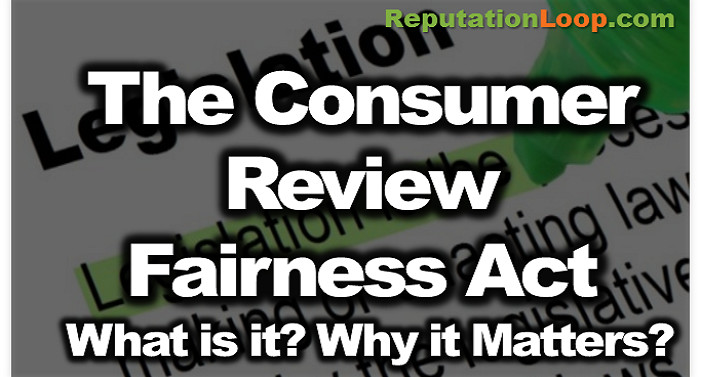The Consumer Review Fairness Act – What It Is & Why It Matters
The Consumer Review Fairness Act (CRFA) is a federal law that protects consumers’ ability to share honest opinions about businesses’ products, services, or conduct. The CRFA was signed into law by President Barack Obama on December 14, 2016. It makes it more difficult for businesses to sue over negative reviews and generally voids form contracts between sellers and consumers that prohibit or restrict reviews, impose penalties or fees, or require intellectual property rights to be transferred. The CRFA also bans the use of gag clauses in non-negotiable consumer form contracts.
- Online reviews
- Social media posts
- Uploaded photos
- Videos
- Consumer evaluations of a company’s customer service
The Consumer Review Fairness Act (CRFA) protects people’s ability to share their honest opinions about a business’s products, services, or conduct, in any forum, including social media. Is your company complying?
Contracts that prohibit honest reviews, or threaten legal action over them, harm people who rely on reviews when making their purchase decisions. But another group is also harmed when others try to squelch honest negative reviews: businesses that work hard to earn positive reviews.
The Consumer Review Fairness Act was passed in response to reports that some businesses try to prevent people from giving honest reviews about products or services they received. Some companies put contract provisions in place, including in their online terms and conditions, that allowed them to sue or penalize consumers for posting negative reviews.
Here are some basic tips for complying with the law.
What kind of reviews does the law protect?
The law protects a broad variety of honest consumer assessments, including online reviews, social media posts, uploaded photos, videos, etc. And it doesn’t just cover product reviews. It also applies to consumer evaluations of a company’s customer service.
What does the Consumer Review Fairness Act prohibit?
In summary, the Act makes it illegal for a company to use a contract provision that:
- bars or restricts the ability of a person who is a party to that contract to review a company’s products, services, or conduct;
- imposes a penalty or fee against someone who gives a review; or
- requires people to give up their intellectual property rights in the content of their reviews.
What specific conduct is prohibited by the statute?
The Consumer Review Fairness Act makes it illegal for companies to include standardized provisions that threaten or penalize people for posting honest reviews. For example, in an online transaction, it would be illegal for a company to include a provision in its terms and conditions that prohibits or punishes negative reviews by customers. (The law doesn’t apply to employment contracts or agreements with independent contractors, however.)
What can a company do to protect itself from inappropriate or irrelevant content?
The law says it’s OK to prohibit or remove a review that:
- contains confidential or private information – for example, a person’s financial, medical, or personnel file information or a company’s trade secrets;
- is libelous, harassing, abusive, obscene, vulgar, sexually explicit, or is inappropriate with respect to race, gender, sexuality, ethnicity, or other intrinsic characteristic;
- is unrelated to the company’s products or services; or
- is clearly false or misleading.
However, it’s unlikely that a consumer’s assessment or opinion with which you disagree meets the “clearly false or misleading” standard.
What’s the penalty for violating the Consumer Review Fairness Act?
Congress gave enforcement authority to the Federal Trade Commission and the state Attorneys General. The law specifies that a violation of the CRFA will be treated the same as violating an FTC rule defining an unfair or deceptive act or practice. This means that your company could be subject to financial penalties, as well as a federal court order.
To make sure your company is complying with the Consumer Review Fairness Act:
- Review your form contracts, including online terms and conditions; and
- Remove any provision that restricts people from sharing their honest reviews, penalizes those who do, or claims copyright over peoples’ reviews (even if you’ve never tried to enforce it or have no intention of enforcing it).
The wisest policy: Let people speak honestly about your products and their experience with your company. source

